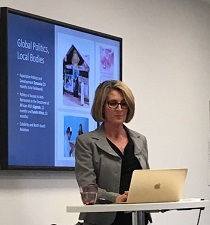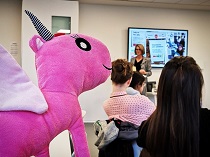Globalization and 'Commodifying Compassion'
Globalization and 'Commodifying Compassion' |
|
|
Inaugural lecture
As the lecture illustrated, Richey’s research through two decades has focused on ongoing global changes and their implications for the people “left out” of globalization. These processes remain a critical field of study, even as globalization is replaced by new ways of connecting some and disconnecting others.
In particular, Richey has studied how businesses are becoming new important actors in the efforts to reconcile the effects of globalization between North and South. |
Source: Matthew Archer Twitter account |
|
Commodified compassion
As part of her current project, Commodifying Compassion: Implications of Turning People and Humanitarian Causes into Marketable Things, a pink winged unicorn toy from IKEA’s ‘Let’s Play for Change’ campaign was passed around among the audience. The unicorn exemplified the overall objective of Richey’s current research to understand how “helping” has become a marketable commodity and how this impacts humanitarianism |
Source: Pernille Bærendtsen Twitter account |
|
materially and symbolically.
Everyday Humanitarianism Recently, Professor Richey has also received a major research grant from the Danida Fellowship Centre for the project Everyday Humanitarianism in Tanzania. The new project will enable Richey (together with project partners from Tanzania as well as Denmark) to pursue her interest in the everyday practices of citizens that are engaging in humanitarianism, outside of the formal structures of humanitarian actions. Read more about ‘EveryHumanTZ’ in the MSC news list.
For more information about Lisa Ann Richey’s research, please visit her personal website or contact her on lri.msc@cbs.dk.
On 8 March, the seminar with Dr Kate Wrigth: Digital Humanitarianism in Africa was co-hosted by the Commodifying Compassion project. |
|

